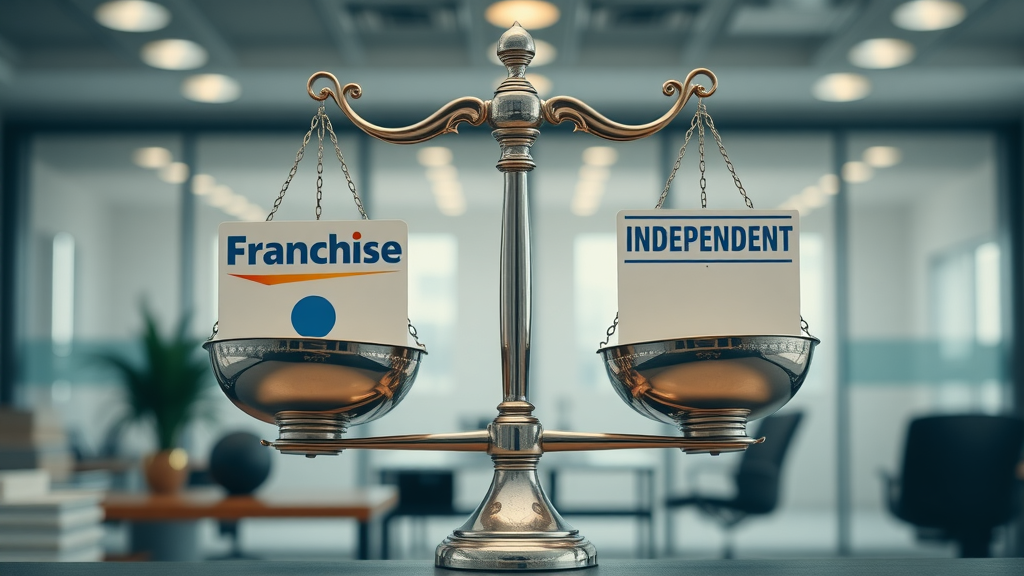Did you know that over 792,000 franchise businesses generate nearly $827 billion annually in the United States alone? With so much money at stake and the promise of a turnkey operation, it’s no surprise so many entrepreneurs ask themselves, is running a franchise a good idea? But behind the glossy marketing brochures lies a web of both opportunity and challenge. In this no-nonsense guide, we cut through the hype and reveal the pros and cons of buying a franchise, including key insights on the franchise business model and fees, so you can decide if it’s right for you.
A Surprising Look at Running a Franchise: Is It Really a Good Idea?
If you're considering whether buying a franchise is a good idea for your business plan and goals, you are not alone. The franchise industry has flourished over the past decades, promising structured business models, recognizable brand names, and a proven path to entrepreneurial independence for many business owners. But is owning a franchise really the right choice for every business owner? Practical examples show that while the draw of instant recognition and a proven business plan is powerful, owning a franchise also comes with substantial costs and constraints such as franchise fees, royalties, and strict operational requirements. Before you buy into the hype, you should understand how these franchise fees, operational requirements, and business model factors fit your personality, finances, and long-term business goals. Let’s dive in and examine the realities of running a franchise business — from key statistics about the franchise industry to the intricacies of franchise agreements — to help you make an informed, financially sound decision.
Understanding Is Running a Franchise a Good Idea? Assessing the Franchise System
What is a Franchise System and How Does It Compare to Independent Business?
The heart of the franchise question lies in the difference between operating a franchise system and starting an independent business. A franchise business allows you to leverage an established brand, benefit from operational support, and enter a market with a tested business model. In contrast, independent businesses demand comprehensive market research, business plan development, and branding from scratch. The tradeoff? Franchisees must pay ongoing franchise fees, adhere to strict access and operational guidelines, and often have less creative freedom in running the business or marketing and advertising. Small business owners might savor the independence of an independent business but also face greater obstacles in securing a business loan or developing national brand recognition. Ultimately, deciding whether to buy a franchise or strike out on your own comes down to your goals, tolerance for risk, and desire for independence.

Key Features of a Franchise Business Model
-
Brand power and support: Franchisees get access to logos, trademarks, standardized operations, and national or even international marketing and advertising support.
-
Operational guidelines: Rigorous training, supply chains, and step-by-step business procedures are part of the package, but so is adherence to every single policy.
-
Ongoing franchise fees: These are typically a percentage of revenue or a fixed monthly payment required for continued use of the brand and support.
-
Franchise disclosure regulations: All franchises must provide potential franchise owners with a franchise disclosure document (FDD) that lays out fees, obligations, risks, and historical performance, ensuring transparency for your decision to buy.
Pros and Cons: Is Running a Franchise a Good Idea for Aspiring Business Owners?
Comparison of Pros and Cons of Running a Franchise vs. Starting a Small Business
|
Pros of Running a Franchise |
Cons of Running a Franchise |
|---|---|
|
|

-
Advantages of running a franchise:
-
Proven business plan
-
Training and marketing assistance
-
Easier access to capital
-
-
Potential drawbacks to buying a franchise:
-
Ongoing franchise fee obligations
-
Less flexibility than owning an independent business
-
Franchise disclosure bluntness: what’s not in the brochure
-
"A franchise gives you a roadmap to follow, but you still steer the car."
Analyzing the Franchise Business Model: Does It Suit Every Business Owner?
Who Should Consider Running a Franchise?
Not every aspiring entrepreneur is suited for a franchise opportunity. If you value structure, operational support, and brand recognition, buying a franchise can be a good idea. Business owners who thrive within systems and enjoy working with established protocols often find the transition to franchise ownership smoother than those who crave total independence. However, if you want full creative and operational control, or prefer building a unique local brand identity, running an independent business might be more appropriate. Consider how much risk you’re willing to assume and the type of guidance you desire as those priorities will determine your path to success.

Prospective franchisees also benefit when they’re willing to follow established rules and have enough capital to meet initial investment and ongoing franchise fees. Buying a franchise can be a smoother entry point for first-time business owners because of the training and systems provided, but this does not guarantee success. Do your market research, assess your own work habits, and seek feedback from existing franchise owners before taking the leap.
Key Factors in Choosing the Right Franchise System
-
Franchise fees and total investment : Calculate the complete financial commitment, including the franchise fee, ongoing royalties, and necessary starting capital.
-
Business plan assessment : Scrutinize the underlying business plan for market viability and growth potential in your area.
-
Brand reputation and market demand : Evaluate how well the franchise brand is recognized, and how much real customer demand exists in your target location.
Each of these elements can make or break your experience as a franchise owner. Prioritize due diligence, and never rely solely on flashy franchisor presentations or high-level statistics. The right franchise business model matches your resources, local market, and ambitions.
Costs Breakdown: Franchise Fees, Disclosure, and Financial Realities
Understanding Franchise Fee Structures When Buying a Franchise
One of the most important aspects to weigh before you buy a franchise is the full franchise fee structure and how it impacts your overall business plan. Unlike an independent business, a franchise business typically charges a significant up-front fee (ranging from $10,000 to $50,000+) plus ongoing royalties (between 4-8% of gross sales) and marketing fund contributions. Top brands often require higher initial investments in exchange for name recognition and support. The revenue potential can be attractive, but franchise business owners must plan carefully for these recurring expenses; otherwise, profits can get quickly eaten up by fees. When evaluating franchise opportunities, always factor in both the obvious and hidden charges — from initial investment to regular franchise and advertising fees — so your business plan stays on track from the beginning.
Average Franchise Fees and Ongoing Royalties by Industry
|
Industry |
Initial Franchise Fee |
Ongoing Royalty |
|---|---|---|
|
Fast Food |
$20,000 - $50,000 |
5% - 8% of gross sales |
|
Retail |
$10,000 - $40,000 |
4% - 7% of gross sales |
|
Fitness |
$15,000 - $40,000 |
5% - 8% of gross sales |
|
Home Services |
$8,000 - $30,000 |
4% - 7% of gross sales |

The Importance of the Franchise Disclosure Document
The Franchise Disclosure Document (FDD) is your blueprint for success — or caution — when considering buying a franchise as it details all franchise fees, obligations, and risks . It lays out all financial requirements, legal risks, litigation history, earnings claims, and contractual obligations. Don’t just skim this critical document; scrutinize every section. Pay special attention to fees, renewal and termination clauses, restrictions, and historical performance of other franchise owners. Unfavorable hidden costs and obligations often lurk within the FDD, so consulting with a franchise attorney before signing is imperative. Remember, a single overlooked clause can turn an attractive franchise opportunity into an expensive regret. This step sets the serious franchisee apart from the casually curious and can determine whether owning a franchise is a good idea for you.
The Franchise Business Plan: Laying the Foundation for Success
Building an Effective Business Plan for Your Franchise
No matter how recognizable the franchise brand is, your future as a franchise owner ultimately depends on a solid business plan. This plan should quantify your initial investment, forecast expected costs, project revenue (using franchisor-provided benchmarks), and include a resourceful strategy for reaching your break-even point. Conduct thorough market research to tailor your plan to the local market realities, not just national averages. Your blueprint should also factor in best-case and worst-case scenarios and detail steps to secure a business loan if you need additional capital. A solid business plan transforms lofty ambitions into achievable business objectives, helping you track performance milestones and adjust strategy as needed for a successful franchise business.

Tips for Mastering Marketing and Advertising within a Franchise System
Strong marketing and advertising skills can dramatically improve your franchise’s success, even within the boundaries set by corporate franchise system guidelines. Utilize the national advertising and marketing support provided by the franchisor, but also develop local strategies — think social media, local partnerships, or hosting community events — to increase visibility in your region. Carefully analyze which promotional tactics generate the best ROI, and don’t hesitate to seek advice from top-performing franchise owners within your network. Smart, localized marketing ensures you get noticed, stay competitive, and maximize every dollar spent, enabling your franchise location to thrive.
People Also Ask
Is It Worth It To Own a Franchise?
Owning a franchise offers the benefit of a proven business model, brand recognition, and structured support, which often translates into lower risk and higher average survival rates compared to starting an independent business. However, profitability depends on many factors, including location, management skill, and franchise system strength. While some franchisees build multi-unit empires, others face ongoing costs and tough local competition. Weigh these variables and your own goals before diving in.
What Is the Downside to a Franchise?
The biggest downsides to running a franchise are lack of control and ongoing franchise fee obligations. Franchisees must comply with strict operational systems, often at the expense of personal innovation. Disputes can arise over territory, contract renewals, or changes in franchise rules. Before buying a franchise, understand that the security a franchise offers comes at the price of flexibility and sometimes, autonomy.
Why Is It Only $10,000 To Open a Chick-Fil-A?
Chick-fil-A’s low entry fee is unique in the franchise world. The company covers construction and equipment, but the process is highly competitive, accepting only a tiny percentage of applicants. Operators don’t own equity in the business and face rigorous performance expectations. For most franchisees, opening a Chick-fil-A is hard to secure, but the benefit is an industry-low initial investment.
Can You Make Good Money Running a Franchise?
Your earning potential depends on the franchise system, location, industry, and your operational skills. National franchise brands with high traffic and recognized names can generate substantial returns, but success is never guaranteed. Realistically, a franchise business owner should expect several years to reach strong profits, and should plan for fluctuations based on local market demand and operating costs.
Critical Checklist: Questions to Ask Before You Buy a Franchise
-
Have you reviewed the franchise disclosure document?
-
Do you understand all franchise fees involved?
-
Is the business model suited to your goals and experience?
-
What do current franchise owners say?
This checklist empowers prospective franchisees to dig deeper before committing capital or signing a contract. By answering these questions honestly, you reduce the chance of nasty surprises after opening your doors.
Real-World Insights: Stories from Franchise Business Owners
"Owning a franchise meant starting with a blueprint; turning it into a successful business was up to me." — Franchisee
-
Positive Case Study: Jamie, a first-time entrepreneur, bought into a well-established sandwich franchise. By following the corporate business plan, utilizing national marketing, and building local partnerships, Jamie grew her unit’s sales by 30% in two years, eventually opening a second location.
-
Cautionary Case Study: Tom acquired a cleaning franchise without thoroughly reviewing hidden contract clauses in the disclosure document. Unexpected marketing fees and poor regional support left profits thin, illustrating the importance of full due diligence and clear communication with existing franchisees.

Expert Answers to Common Franchise FAQs
How Much Do Most Franchise Fees Cost?
Franchise fees range from $10,000 to over $50,000 depending on brand and sector, with ongoing royalties an additional 4-8% of monthly sales.
What’s in a Franchise Disclosure Document?
The FDD outlines financials, obligations, past performance, litigation, and details about the franchisor, all of which are vital for any buying decision.
Are All Franchises a Good Idea for First-Time Business Owners?
Not always. Some franchises offer great support and proven business models ideal for beginners, while others can overwhelm newcomers with complexity and costs. Assess each opportunity carefully.
Summary: Is Running a Franchise a Good Idea? Key Takeaways for Future Business Owners
-
Assess your priorities, risk tolerance, and financial capabilities before buying a franchise
-
Evaluate multiple franchise systems using disclosure documents and direct inquiry
-
Weigh the pros and cons and calculate your return on investment
-
Learn from real franchise business owner experiences
Is running a franchise a good idea? It depends on your goals and the franchise you choose
Ready to take the next step? Start your franchise discovery today — ask questions, read the documents, and connect with franchise owners to ensure your decision leads to lasting business success.
 Add Row
Add Row  Add
Add 




Write A Comment